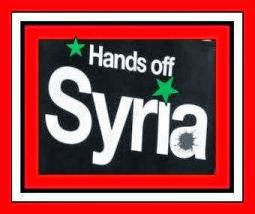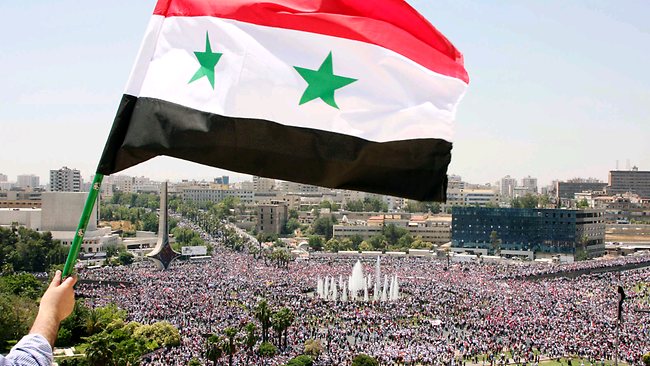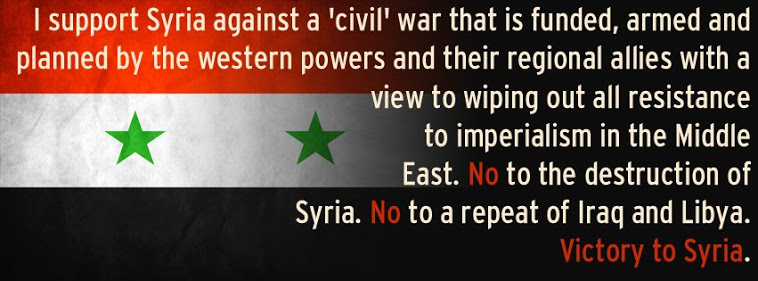17 January 2013
Paul Wood and cameraman Fred Scott visited the war-torn city of Aleppo
(Please note that the BBC video starts after the commercial)
(Please note that the BBC video starts after the commercial)
After many hours of waiting in the pitch black and freezing cold for the bakery to open, the crush of men at the head of the queue started drumming on the doors in frustration.
An activist was explaining to me how the bread shortage in rebel-held parts of Aleppo was another crime to be heaped on the head of Bashar al-Assad.
He was waved away by a stout matron in a hijab and long black coat.
"Don't blame Bashar. What's happening to us is of our own making," she said as, behind her, Free Syrian Army (FSA) fighters struggled to keep order.
It is widely believed in Aleppo that the bread shortage was caused by the FSA stealing flour to sell elsewhere.
An FSA officer confirmed as much when I asked him if this had been done by individual fighters or was ordered by commanders to fund their operations.
"Both," he said, "including my own brigade." He added, ruefully: "We are all thieves."
It was a joke, and his men erupted in laughter, but he meant it seriously, too.'Syrian mujahideen'
The beneficiaries of this are the hardline Islamists, especially Jabhat al-Nusra, or the Nusra Front.
They have now taken over distribution of flour to bakeries in rebel-held areas of Aleppo.
None of the FSA brigades - all accusing each other of looting - trusted anyone else, the officer told me.
The Nusra Front is outside the FSA and has a reputation for discipline and honesty. It is also a jihadi group behind most of the suicide bombings in Syria and as such is on a US blacklist of terrorist organisations.
It announced itself to the world one year ago in an internet video that claimed several recent car bombings.
A masked man on the video declared: "We are Syrian mujahedeen, back from various jihad fronts to restore God's rule on the Earth and avenge the Syrians' violated honour and spilled blood."
He went on: "Every free and noble man must take up arms, even if he has to sell his furniture to do so… Oh people of manliness! Jabhat al-Nusra has taken upon itself to be the Muslim nation's weapon in this land."
The Nusra Front is a feared and a secretive organisation but after long negotiation we were able to speak to an emir, or senior commander.
As you might expect, the emir, Abu Lokman, set out a vision of Syria as an Islamic state ruled under Sharia.
This was not a fight for democracy.
"In the name of God, praise is to God and peace upon our Prophet Muhammad," he began, "the people in Syria are religious by nature."
"They like Islam. People here are fed up with socialist and secular regimes. They are all looking forward to an Islamic state. It is impossible there could be anything else in Syria."Teaspoon of explosives
Abu Lokman was in his thirties and had been a student before being arrested by the regime in 2008.
He was active on jihadi internet forums and joined Jabhat al-Nusra while it was still a secret organisation, six months before the video announcing its existence.
Abu Lokman said the West was afraid of Islamists' long beards
He wore a ski-mask for our interview, a necessary precaution against the regime's spies, he explained.
Outside his office were bearded fighters, including two in Yemeni dress, carrying traditional curved knives along with their Kalashnikovs and wearing the short dish-dasha of the pious.
A bag of explosives was delivered, a sample sent by a dealer. It was white powder - probably ground-up fertiliser and diesel. It was tested by setting a teaspoonful on fire. It burned very nicely.
I asked: How do you justify suicide bombings which might kill civilians?
"It's not just us who use suicide bombings; many other factions of the FSA do.
"The regime plants car bombs among civilians and accuses us of doing it to destroy our reputation... God forbid we take any civilian lives, whether Muslims or non-Muslims, Christians or others."
The United States calls you a terrorist group, I said.
"The West is afraid of our long beards - even though the Jews grow their beards, too.
"Muslims are portrayed in the West as savages. The West is conspiring against us
"When the US placed us on their list of terrorists, it did us no harm, it elevated our reputation. The Syrian people hate the American government. Thanks be to God, we consider this a medal of honour."
Are you al-Qaeda, I asked.
"We both use the same language, the same terminology as we are all Arabic speakers. But there is no connection [between Jabhat al-Nusra and al-Qaeda] - we are Syrians."
What if the US and others wanted to bomb the regime?
"We are not campaigning for or against this. Of course, if they destroy the regime's military posts, that is in our favour. But we don't want an intervention because we are the people of this country and we are able to defend our own country."'Non-sectarian'
This was the first broadcast interview by a member of Jabhat al-Nusra's leadership.
The emir was being cautious.
This was a Syrian fight, not part of a wider jihad. They had no hostile intent to any other states - as long as they did not support the regime.
There would be no sectarian attacks against Syria's minorities. Christians, especially, had nothing to fear.
"Our religion allows us to marry Christians, eat your food and live amongst you.
"We have many fatwas telling us not to exploit the Christians' blood and possessions. Christ is our prophet too - how much do you love Christ? I love him more than you do."
As the emir was being interviewed, a trail of supplicants came and went
When not attending to military matters, the emir dealt with a variety of requests.
A trail of supplicants came and went.
It was clear how important the group had become to daily life here.
A man had run out of cooking gas. Another complained his sons would not support him in his old age.
A widow begged for help in getting her inheritance from her dead husband's family. A man asked for help in freeing his cousin, arrested by an FSA brigade.
The man detained was a tribal elder accused of having had a "loyalty tent", where before the revolution people would chat under a framed picture of the president.
His family said they had been told the price of his release would be several million Syrian pounds (tens of thousands of UK pounds or US dollars).
We heard many such stories of people arrested - kidnapped might be a better term - based on flimsy claims of a connection to the regime.
Demands for money often followed. Raising a voice in protest could invite the deadly allegation of being a Shabiha, a member of the brutal regime militia.Sharia court
The atmosphere in Aleppo has a touch of Paris in 1944: the mistrust and the score settling, the finger-pointing at collaborators, real or imagined.
In our block of flats, if people spot a car full of FSA fighters coming to arrest someone, they swarm onto the street to try to stop them.
We heard about a man whose new car was seized at an FSA checkpoint.
He complained to the Nusra Front. The FSA brigade concerned brought witnesses who swore he was a Shabiha and he was thrown into jail.
He was later freed - and his car returned - after the Nusra Front assigned the case to Aleppo's new Sharia court.
The Sharia court is being set up by the Nusra Front along with three of the more Islamist brigades of the FSA.
It is supposed to be an alternative to the secular justice system formerly run by the Syrian state and to operate in parallel with it.
But its influence can already be felt widely.
Difficult problems, which cannot otherwise be solved, are sent over to the court.
An FSA official had been too nervous to grant us a permit to film at the bakery, for instance.
"Often people in bread queues start chanting slogans against the FSA," he'd said.
He directed us instead to the Sharia court, which provided the necessary piece of paper.
All of this is happening as the battle for Aleppo continues.
The day after we left, an air strike hit a block of flats in the area where we had been staying, leaving some 26 people buried under the rubble.
But the war seems more distant, the bombing and shelling an occasional interruption rather than a constant thump, gripping the stomach in a permanent spasm of fear.
The regime's forces are bottled up in a few bases; the areas of "liberated" territory expanding.Taste of ashes
The FSA always suspected that Aleppo's heart was never really in the revolution.
Many in Aleppo support the FSA but others turn to hardline groups
Now the shopkeepers, farmers and small businessmen of the countryside are in charge in large parts of the city.
They are discovering that victory has a taste of ashes.
"Free Aleppo" has eight-hour bread queues, power cuts, children scavenging for rubbish to burn and trees in the parks all cut down for firewood.
Some people here - many in fact - still support the FSA, but amid the chaos and shortages, and the problems of the FSA's own making, others are turning to hardline groups such as the Nusra Front, attracted by their reputation for discipline and honesty, bravery and piety.
They will undoubtedly have a big say in Syria's future.
What does this mean for Western governments debating whether to intervene?
Taking tea in a neighbour's shop, I met a 30-year-old Nusra Front fighter called Abdullah.
"The Nusra Front is the son of al-Qaeda," he told me.
"We are this close," he went on, rubbing his two index fingers together.
He had worked in a woman's clothes shop before the revolution. And after the revolution?
"No more dresses," he said. He would take the jihad to Somalia, Mali, Jordan, Iraq, "wherever there are Muslims".
Western governments, then, face a dilemma.
If arms are allowed to reach the Syrian rebels, they could end up in the hands of radical Islamists.
But if moderates in the uprising are not identified and supported, power will flow to the best organised and most disciplined fighters. At the moment, those are the jihadists.
..












0 Comments